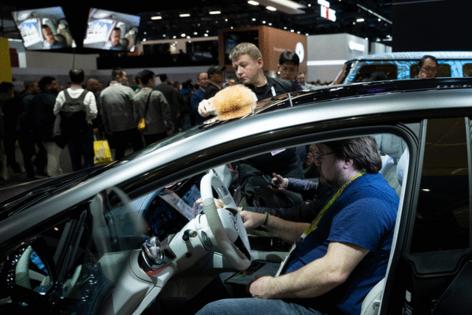Editorial: If we stop making electric vehicles a political football, the market will grow faster
Published in Op Eds
Anyone glancing at the headlines might think the electric vehicle market is doomed: Mainstream shoppers are skeptical, old-fashioned gas guzzlers are making the profits, and ex-President Donald Trump has vowed to target the Democrats’ pro-EV policies if he wins on Nov. 5.
In fact, the market for EVs is growing at a good clip, albeit more gradually than in recent years. Automotive research company J.D. Power predicts EVs will account for 9% of new-vehicle sales in the U.S. this year, up from 7.6% in 2023, 5.9% in 2022 and a mere 3.2% in 2021.
That’s a lot of growth for a mature industry, and automakers are going after it. The Detroit Three are making multibillion-dollar investments in EVs, rolling out fun-to-drive new models and banking on an electric future — with or without the Biden administration’s EV-friendly rules and incentives.
Elon Musk, boss of market leader Tesla, says he’d be fine without the subsidies and he’s confident in his company’s future, telling Wall Street in late July: “We still obviously firmly believe that EVs are best for customers and that the world is headed for a fully electrified transport, not just the cars but also aircraft and boats.”
So what is keeping EVs from growing more quickly? A lot, as we will explain, but there’s a simple fix on the horizon if only the marketplace is allowed to do its thing.
For starters, transformative new technologies often plateau after attracting early adopters. It takes time to win over less-enthusiastic shoppers. Add to that phenomenon the much-discussed concerns about the availability of public charging stations, which lead to doubts about how far these cars can go before their batteries die.
So-called “range anxiety” increasingly has led U.S. shoppers to consider hybrids like the Toyota Prius, which runs on an electric engine but has a gas-powered engine as well. Hybrids compete effectively against EVs because they use less gasoline than conventional vehicles (creating less pollution), while eliminating worries about running out of juice on a long road trip.
The big automakers have themselves to blame, too. After going all-in on developing EVs in recent years, they’ve experienced production headaches and retrenched in the face of pushback from consumers and dealers alike. That has led to a series of delayed vehicle launches, creating an additional drag on sales.
Politicians haven’t helped, either. The Biden administration has dangled tax credits and other valuable incentives, but they can be complicated to use. And at the same time the White House was pushing to electrify practically anything that moves, it effectively banned inexpensive Chinese EVs by imposing a 100% tariff.
There’s reason for caution about the proliferation of cheap Chinese EVs, which Biden has called “smartphones on wheels,” and reasonable tariffs can be a reasonable weapon against so-called “dumping.” Nonetheless, Chinese products compete in many other U.S. product markets and there’s no reason why vehicles should be excluded. In effect, Biden is working against his own costly efforts to promote EVs, keeping prices higher than if there were more reliance on market forces.
Meanwhile, Republican lawmakers have made EVs a culture-war weapon as they seek to roll back Biden’s green agenda, claiming the market would evaporate without government subsidies that, in their view, mostly benefit wealthy Hollywood types anyway. Trump has said he will roll back Biden’s fuel-economy standards, which favor EVs, and may eliminate the tax credit, too.
This all sounds bleak for the future of EVs, but one big swing factor is finally coming to the forefront: cost.
Labor costs are up for automakers, and gasoline-powered vehicles today require about 30% more labor to produce than an EV — which has no fuel-injection systems, complicated transmissions or other tough-to-assemble components. Advanced robotics and artificial intelligence could widen the differential even more in the future.
EVs also are less costly to operate. People think first of the savings on fuel, but EVs also have far fewer parts subject to repair: There’s no radiator, no exhaust, and a simple gearbox powers the wheels. Commercial operators are catching on, willingly paying more in up-front sticker prices to take advantage of the lower cost of ownership.
Retail customers are only beginning to recognize the economics behind EVs. In late July, Ford Chief Executive Officer Jim Farley told Wall Street analysts that based on usage and cost-of-ownership data, roughly half of the company’s customers who bought gas-powered cars would have been better off going with EVs instead.
Sticker shock remains a big barrier to wider acceptance, but prices are coming down. Kelley Blue Book pegs the average transaction price for an EV at $56,520 versus $48,401 for a gas-powered vehicle. Ford’s Farley says he’s focused on producing smaller EVs priced under $40,000 or even $30,000, which are more profitable for the automakers than bigger EVs requiring a ton of expensive batteries.
We’d love to see politicians take a lighter hand with this up-and-coming market. American automakers can’t afford to sit out the global transition from gas to electric. Instead of making EVs a half-baked campaign issue or ham-handedly rigging the regulatory environment, how about letting consumers have a greater say?
Americans are smart when it comes to making big purchases, and it’s becoming increasingly obvious that EVs can be a smart choice for many consumers. Let’s see what these cool new machines can do when they’re not overloaded with political baggage.
_____
©2024 Chicago Tribune. Visit chicagotribune.com. Distributed by Tribune Content Agency, LLC.




























































Comments